IV. Our Church Life should be an Invitation to Come to Jesus, take His Yoke, and You will Find Rest: We are to embody the invitation to Come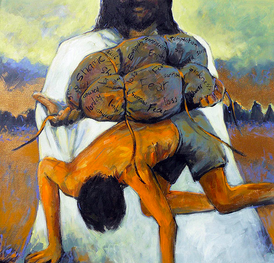 Our little Hill church puts itself into the heart of the community: at the Hill North Community Management Team, the Free Sidewalk Breakfast each Saturday, our Summer Park BBQ ministry; showing up to almost every community event, and my pastoral street counseling right out my front door. When John the Baptist was facing the end of his ministry (in Matthew 11), he told his own disciples to go ask Jesus if he was the One or should they look for another (was this for John or his disciples, I have my opinion on that, but it is surely for the church). How do they know Jesus is the One and there is none other to look for? Jesus asks them what they see (which implies action, demonstration, something happening): How do they know? ➥ the blind receive sight ➥ the lame walk ➥ lepers are cleansed ➥ the deaf hear ➥ the dead are raised up ➥ the poor have the gospel preached to them (Matthew 11:4-6) This is exactly what Jesus has been doing as his disciples followed him around. No doubt this is Matthew’s version of Luke’s draw on Isaiah 61, which promises that God’s Spirit would be on the Messiah to preach the gospel to the poor, to heal, to free and bring justice (Isaiah 61:1). This is the context in Matthew. This is exactly what Jesus is doing. This is what the temple and synagogue leadership miss, ignore, or are fighting against.They are still bothered for in Matthew 11:19 there is more accusation: . . . they say, ‘Look at him! A glutton and a drunkard, a friend of tax collectors and sinners!’ We end our thread in Matthew 11 where Jesus invites all who labor and are heavy laden to come. First, Jesus praises the Father that “all things have been handed over” to Him “and no one knows the Son except the Father, and no one knows the Father except the Son and anyone to whom the Son chooses to reveal him.” As Presbyterians, we identify with this divine election. Yet we forget that the means of grace to call the elect is given at the same time: 28Come to me, all who labor and are heavy laden, and I will give you rest. 29Take my yoke upon you, and learn from me, for I am gentle and lowly in heart, and you will find rest for your souls. 30 For my yoke is easy, and my burden is light.” Recently during a Hill Sunday sermon on Matthew 11, I asked my own congregation: “How do you think the young church, with nothing much to offer, no social or political power, possessing little resources—and life didn’t really get easier and better for early believers. They risked everything, and for most, life got harder. In the first 150 years after Pentecost, how did Christianity became the largest religious sect in and around the Roman Empire? How? They accepted all into their fellowship, this changed their households . . . street by street, village by village, table by table. It all changed where gathered-churches lived out “Come all who labor and are heavy laden.” The body of Christ, the local church, with Jesus our Head, ruling and reigning at the Father’s right hand, is His presence in the community, in the Hill community, in your community right here in Concord. We show them Jesus by who we are and what we do so that all who struggle and toil and are carrying burdens no one should carry alone (because they see) hear the invitation to Come to Jesus and take on His yoke and find rest. We are to embody the invitation to Come. We need to be refreshed in the gospel every time we gather because we need the power of the gospel in order to be the gospel in action. I might get everything else wrong about church planting . . . I might not even be very good at it, at least not good at what is expected . . . but one thing I will get right, by God’s grace, to help the CPC in The Hill flock understand and know what it means to follow Jesus around . . . Our church does this . . . even though we are a church in an under-resourced community, we spend ourselves on our community, attempting to associate with the lowly, the hurt, those who's lives are messing, unclean, spoiled, and forgotten. A church needs to be where crowds are (out in the ebb and flow of community life): this is why our small under-resourced church spends its time in the community, places where crowds show up. This is what it means to follow Jesus around and it is how others know that the kingdom of heaven has appeared. *This sermon was preached at Redeemer Presbyterian Church in Concord, MA on Sunday, May 19, 2019. The full sermon maybe downloaded as a PDF (here). An audio version is also be available >> Audio version Part I | Part II | Part III | Part IV
0 Comments
III. We demonstrate the presence of the Kingdom by sending Laborers into God’s Field to do what Jesus did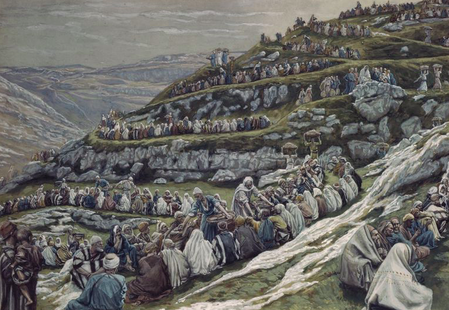 We have moved into the Hill. We relocated. (You all made this possible—thank you.) This is important: most pastors of churches in places like the Hill don’t live in the church’s neighborhood. Our moving into the Hill is a big deal—that’s what our neighbors tell, too. This is huge because there is a connection between the gospel and the community . . . between Shepherds and the community . . . between churches and the community. No wonder Jesus calls for laborers for the harvest. Another summary at the end of Matthew 9.
The reason for Jesus’ compassion is that they were sheep without a shepherd, harassed and dispirited. Jesus mixes his metaphors and says that there is a need for Shepherds for the Harvest is rip. “Harvest” is a great eschatological, end time word used throughout the Old Testament. “Harvest” means we are in the age of the appearance of the Kingdom of Heaven, but it also suggests that the end is near (of course eschatologically near, but also timely, the time to harvest is now; this gives us an urgent frame for the task). We should not be surprised that there is a relationship between this crowd of outsiders, unclean, lame, diseased, their condition (harassed and dispirited), and the absence of a Shepherd. People die without a shepherd. This is why we pray to the Lord of the Harvest to send forth laborers, send Shepherds into the field. I am humbled by how I am greeted on our apartment’s street: “Pastor.” “Rev.” “Park Pastor.” My favorite is “Hey, Preach.” But the one that honors me the most is when my neighbors call me, “Pastor of the Hill.” That’s crazy, right? I had just walked out of our apartment front door, heading to my car for a meeting, when I heard, “Pastor, come here.” This happens often. I do not carry cash on me. This is an important rule ministering where I pastor. Usually it is, “Do you have a dollar?” or “I need $8.50 for a bus ticket.” It’s hard, but I need to say, “No, I don’t.” Yet, I am a neighbor. And, a pastor (which most of our neighbors know) . . . so, sometimes I try to find other ways to help. This morning an older gentleman, who lives across the street (he admits his drinking problem and has a hard time walking because of his heart), pulled me in close and whispered to me, “Do you have a bag of groceries?” This is a tough one . . . I gave him my normal reply, but added, “When I get back, I’ll see what I can do to get you some food.” I located a $20 and found him still sitting where I left him. “Let’s go to the corner store and get you $20 bucks worth. No cigarettes though.” We walked slowly, stopping every 25 feet or so for him to catch his breath. Once inside the corner store . . . it was missional . . . a small crowd was there. Some teens shouted, “Hey, Pastor Chip!” I introduced myself to the others. Fist bumps all around. My older neighbor then surprised me when he started introducing me to his friends in the store, “This is my pastor.” Didn't expect that. And, he said it more than once. I held back tears. Of course, there are plenty of food resources, shelters, and food pantries in New Haven, which is my usual go-to reply. But, my presence in the neighborhood isn’t to be a social-worker or case-worker. This is a neighbor, someone I talk to regularly, and to whom I have given some street pastoral counseling—hard to just defer when, in some way, he’s one of my sheep (at least a street sheep). Plus, this man is abused by his boarding roommate, his food stamp-card taken regularly, and his landlord won’t do anything—and complaining just makes it harder on him. All this gentleman knows is his drinking, bad health, and sometimes Jesus shows up as his neighbor who also happens to be hispastor. These good people need a shepherd . . . It is no surprise that immediately after having compassion for the sheep that do not have a shepherd (9:36) and praying for the needed laborers to go harvest (9:337-38), Jesus appoints his twelve and commissions them (10:1-15). Although there is far more to this list (vv. 2-4) and their mission (vv. 5-15), I want to call attention to one thing very much related to our thread: Jesus instructs the twelve to proclaim that the Kingdom of Heaven is at hand (v. 7). Jesus calls the 12 disciples (10:1a) and gives them authority to do exactly what he has been doing (v. 1b)–exactly what they observed in following Jesus around as we have observed thus far. Now, they are to be fisher-followers by casting out demons and healing every disease and every affliction (10:1) and, so, they demonstrate that the kingdom of God is present (v. 7): Heal the sick, raise the dead, cleanse lepers, cast out demons (v. 8a). *This sermon was preached at Redeemer Presbyterian Church in Concord, MA on Sunday, May 19, 2019. The full sermon maybe downloaded as a PDF (here). An audio version is also be available >> Audio version Part I | Part II | Part III | Part IV
II. We reveal the appearance of the Kingdom of Heaven when we extend mercy to the (physically and socially) unclean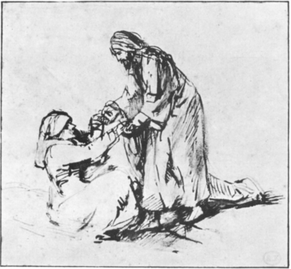 When Lisa and I had moved into our apartment, we were immediately recognized. More typically than not, it seems I can’t walk out my door without hearing, “Hey, Pastor, can I talk to you?” Or, “my friend here needs prayer.” I am immediately confronted with many that are unclean, unbathed, reek of smoke and alcohol; with those who aren’t very coherent; some who spent the night in the park, or the night selling themselves to support drug habits. This isn’t so far from the crowds whom Jesus encountered. I am confronted daily with the difference between the clean and the unclean, literally and socially. Now in Matthew 9:9, Jesus calls the tax-collector Matthew to follow him. Matthew represents half of the problem group of “tax collectors and sinners.” Immediately (v. 11) we hear many of Matthew’s tax collector buddies and sinners came and were reclining [at a supper meal] with Jesus and his disciples. This does not sit well with temple leadership. You have to remember in the social-location at that time, this all would have been very public, with neighbors and “the crowd” and the curious all peering in to the supper venue. Most likely a curious Pharisee was able to get the attention of a few disciples, pulling them out to ask: “Why does your teacher eat with tax collectors and sinners?” (v 11). Jesus overhears the question and takes the opportunity to teach everyone: “Those who are well have no need of a physician, but those who are sick. Go and learn what this means: ‘I desire mercy, and not sacrifice.’ For I came not to call the righteous, but sinners” (vv. 12-13). This begins a thread of accusations from the temple-leadership against Jesus—they don’t like the nature of Jesus’ fishing.The accusation from the Pharisees, “Why does your teacher eat with tax collectors and sinners” is juxtaposed to Jesus explaining his mission, “Those who are well have no need of a physician, but those who are sick.” So, we have those who do not need a physician, meaning the accusing Pharisees and those who are sick, meaning the “tax collectors and sinners.” This is the pattern here in Matthew. Let’s be fair to Matthew. We like to read what Jesus said as “everyone is like a tax collector and we’re all sinners.” No. No. No. Leveling and equalizing this robs us of the narrative impact: I think we can agree Jesus calls Matthew—a real life tax collector—and Matthew invites his friends and entourage to have a meal with Jesus. So here we have the context and the social group meant by “tax collectors and sinners.” Tax-collectors are not only the bottom of everyone’s hate list, they are traitors of the worse kind (Israelites in the employment of Caesar). Sinners are not simply “everyone” (you know because everyone sins—although true, this is not the reference). It is not as if Jesus said, “but those who realize they are sick.” Matthew has been pretty clear that the crowd he has been ministering to and who surrounds Him is made up of all the sick, those afflicted with various diseases and pains . . .(Matthew 4:23-24): these are most assuredly in the narrative the “sinners”: The sick, the mentally unstable, the deceased, the lame. Elsewhere in the gospels, we know that sinners are outsiders (e.g., Galileans), the uneducated, those in sympathy with the Empire, those ignorant of the Law, those outside the insiders of the temple leadership and their friends and families. This is why the Pharisees are offended by Jesus. This is why they do not like the nature of his fishing. Jesus says in the same breath (Matthew 9:13): “Go and learn what this means: ‘I desire mercy, and not sacrifice.’ For I came not to call the righteous, but sinners.”Again, we tend to read this as if Jesus said, “I desire you be saved by grace and not by any works because sacrifices can’t save you.” All good (of course), but misses Jesus’ point.
We are most glad, most thankful that Jesus choses mercy over sacrifice. Looking at the surrounding miracles stories and the summaries in Matthew: Jesus chooses mercy
These are not the things and situations one chooses in that culture and social classing, if one desired to be pure (the goal of the religious elite) or to be perceived as holy (again, the temple-leadership). No. Not at all. We are, however, as fisher-followers, to live out mercy by being in the proximity of the crowd, and thus touching the unclean (literally and socially). This is following Jesus around; and this is doing what Jesus did, here we are made fishers of men, demonstrating that the kingdom of heaven has appeared. *This sermon was preached at Redeemer Presbyterian Church in Concord, MA on Sunday, May 19, 2019. The full sermon maybe downloaded as a PDF (here). An audio version is also be available >> Audio version Part I | Part II | Part III | Part IV
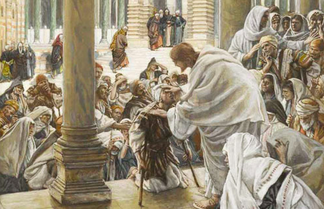 As of January 1, My wife and I live in the Hill, an apartment on Carlisle Street, right next to the Park where we do our summer BBQ ministry. I’m even close enough to walk downtown to meetings and events. One evening, walking back to the apartment from an aldermen’s meeting at town hall, I found myself waiting at a cross-walk when two guys (you can tell, kind of down and out, probably homeless) decided to go, even with traffic coming. One guy had a walker. He walked slow across the intersection, so I headed out with him, telling him, “They’ll have to hit me first.” He smiled and said, “Thanks.” We made it safely, catching up with his friend. They continued to walk slow. I moved on ahead, walking down the block back to my apartment, when I saw a Dunkin Donuts and remembered I had a gift card in my wallet my mom had given me for Christmas. I stopped in to see how much it was for . . . there were no markings . . . $10 the barrister said after scanning it. I went back up the block to my two slow walking friends and said, “Do you guys like coffee?” “Yes,” one of them replied. “I have a gift card for $10—it’s yours.” “Thanks.” They smiled. “Good, we can get a sandwich, too.” I told them: “I can’t take credit for it, my mom gave it to me for a Christmas present.” “Well then, tell your mom, thanks for us.” (I did.) I gave them the card and said, “You’ll see me around. You will see the hat and the ponytail” . . . and, before I could get my name out . . . “Yea, we know. You’re the pastor of the church on Davenport. We know who you are.” How about that? Priceless. Two street, homeless guys, a few blocks from the Hill knew who I was and where our church is. This reminds me that we need to be known . . . and if I get my New Testament correctly, known for the things that indicate the presence of the Kingdom of God. This morning I’d like to bring a messagefrom a thread of passages in the Gospel of Matthew. There is a narrative thread connecting Matthew chapters 4 through 11 that we should listen to, which focuses on Jesus associating with tax collectors and sinners, the poor, the unclean, and the presence of the Kingdom of Heaven. Matthew is asking the readers: How do others know that the Kingdom of Heaven has appeared? To give you the spoiler: Matthew tells us, they can see our association with the poor, marginalized, outcasts, and unclean. This is how they know. I. We are to Follow Jesus around and repeat (what he does):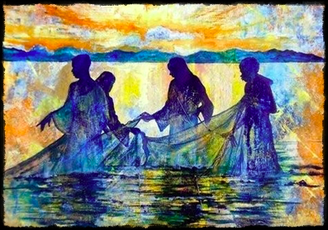 We like to take small bites on the Bible, so sometimes we miss big picture things. And, this is a Big Picture Thing we need to see so we may be better readers of Matthew's Gospel and more faithful followers of Jesus. We begin in Matthew 4:19 where Jesus makes the invitation, “Follow [lit. come after] me and I will make you fishers of men.” The command is to come-after Jesus. That’s the command--follow after me, really follow me around. Most think the command is to be fishers of men—it is not, that’s the promise. We are called to follow Jesus around and he promises to make us fishers of men. By getting the following correct, we become fishers of men. So, what does it mean to follow Jesus around—Matthew tells us. Straight away, just after the call to follow Jesus, Matthew reveals what it was like to follow Jesus around. There is a divine, inspired-ness to what the Gospel writers place into the narrative . . . so right after the scene where Jesus calls us to follow him around, we have . . .
Matthew tells us: we are made fishers of men by following Jesus around—and what did he do?
What we might not realize, however, is Jesus’ first encounter afterHe finishes the Sermon . . . Matthew could have introduced a dozen different encounters, but this is the one He chooses:
This is the Sermon on the Mount realized, illustrated, fulfilled. The Monday after the Sunday Sermon as it were. Now I’m going somewhere with this, so for now remember, following Jesus is actually following Jesus around, learning to do what he did . . . now, we are to repeat . . . *This sermon was preached at Redeemer Presbyterian Church in Concord, MA on Sunday, May 19, 2019. The full sermon maybe downloaded as a PDF (here). An audio version is also be available >> Audio version Part I | Part II | Part III | Part IV
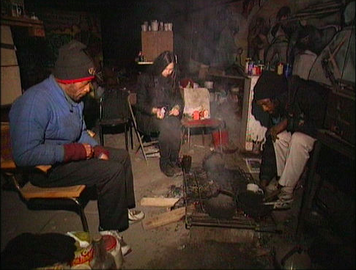 The Mole People of NYC underground The Mole People of NYC underground Some thoughts and ramblings from my sermon this past Sunday at Christ Presbyterian Church in the Hill (New Haven, CT). Our text on Sunday (9/30/18) was Matthew 4:12-22. I talked about church, church planting, and church ministry in uncool places–you know across the Jordon, out of bounds, the wrong side of the promised land, the wrong side of the railroad tracks, the Galilee of Gentiles, yeh them, those guys . . . so uncool and the wrong place to launch a movement that would change the world . . . I talked about the Hill and how outsiders view us . . . my good people let me be really real for a moment . . . and I talked about the Mole people, those cast aways, ignored, forgotten, smelly, hidden folks that live underneath New York City in the vast corridors of old train and subway tunnels . . . uncool . . . and why there isn't a line of Christians lining up for these places (the Hill and the Mole People tunnels) . . . upward mobility is a calling you know, not downward mobility (I am being sarcastic, if you can't tell) . . . where's that line of Christians called to uncool places? Then I talked about Jesus' call to follow him (Mat 4:19, "Follow me and I will make you fishers of men"). Most think this is a call to be fishers of men (whatever you think this means, it isn't); it is a call to follow Jesus and then he promises to make them "fishers of men." And, we saw right there in the story . . . they followed him (so you have the following, 4:20, 22) and then the fisher-training began (4:23 till the end of the Gospel). Matthew, in his crafting of 4:19, the command to follow actually "follow behind me," in other words, watch what I do when we are out in the public. So the fisher-training comes in this set of scenes right away:
I connected the fisher-following to the Great Commission at the end of Matthew. Gave it an intra-Matthean spin in light of the call to follow and the fisher-training: Go, therefore, and make disciples (other fisher-followers who will watch what you do, not just what you preach) of all nations (i.e., ethnic groups/πάντα τὰ ἔθνη), yes out there (to the Jewish first disciples) in very uncool places, among those polytheistic pagans, most definitely those across the railroad tracks. The Hill. The Mole People. Get lined up in those places, baptizing them in the name of the Father and of the Son and of the Holy Spirit, teaching them to observe all that I have commanded you (there's that fisher-training again). Make more fisher-followers because judgment will come (the actual thing behind the "fisher" metaphor), but be assured of this, if you go to those uncool places and make disciples, behold, I am with you always, even to the end of the age when the judgment will come upon the sons and daughters of Adam. Go heal. Be with the oppressed and afflicted. Those having seizures and cannot walk. Those in pain. This is the crowd I went to just after you followed (in chapter 4). This is being fishers of men. And this will be the same crowd, the afflicted and oppressed (note and compare Mat 4:25 and 5:1) that I will teach on that Mount (in chapter 5) is blessed. This will then show that the kingdom of heaven is at hand! For further understanding of the meaning of "fishers of men," check out this Wasted Blog >> Dangerous Sunday Devotions: Called to be fisher-followers of Jesus, emptying our advantage out for those at a disadvantage
When Jesus called his disciples to “follow me and I will make you become fishers of men” (Mark 1:17), most assume a positive evangelistic outcome of reaching people for Christ. Nothing could be further from the reality behind Jesus’ intentions in calling out followers to be such witnessing-fishers. At least the benign, banal application of making this verse a proof-text for “witnessing” is a shallow and narrow application of Jesus’ powerful imagery cast in this tremendous text.
Tax collectors are outsiders; rich they might have been, but they were in the eyes of temple leadership, traitors to God and to God’s people. Yet, the sinners are most certainly the uneducated serfs and peasants, farmers, and those who lived on the margins of life in and around Jesus’ house in Capernaum of Galilee (2:15). One cannot spin from this text a general characteristic that “sinners” are all sinners anywhere you find them. As are the "tax collectors," they are a specific demographic associated with those living as the poor and marginal of Jesus’ day. Jesus’ response, then, takes on an ominous shadow—a fisher shadow, standing on the shore, cast into the waters of those that are "healthy." True fisher-followers of Jesus will not rationalize their standing in the community nor their affluence, but will count their privilege, their advantage, at the disposal of the “sick” who need a physician. Paul is not far from the same imagery when he describes how Jesus took his advantage (his privilege) and gave it all on behalf of all those with the greatest of disadvantage. Have this attitude in yourselves which was also in Christ Jesus, who, although He existed in the form of God, did not regard equality with God a thing to be grasped, but emptied Himself, taking the form of a bond-servant, and being made in the likeness of men. Being found in appearance as a man, He humbled Himself by becoming obedient to the point of death, even death on a cross (Phil 2:5-8). Most likely Amos 4:1-2 is one of the underpinning Old Testament referents that would have given the disciples a frame, a rather menacing edge, for understanding the potency of Jesus’ call on their lives. In view of the inclusion (contextually) of Amos 4:1, namely the “cows of Bashan” referent, I have become wary of the poorly distributed resources, talents, and wealth among the richer, more affluent churches at the expense of the poorer churches, neighborhoods, and urban mission fields. By “expense” I am thinking biblically, not culturally, socially or (heaven forbid) politically, nor through the lens of class, but by the very New Testament discipleship implications, namely that those with advantages (“privilege,” if I may) who are called by their association with Jesus to help those who are at a disadvantage. The assumption that it takes more money to reach the rich and affluent than the poor is turned on its head by the very presence of the Kingdom (cf. Mark 1:17 with Mark 1:14-15). A more gospel-centered and mature view of discipleship seem to argue that it takes far more resources to go into the poor urban fields to bring forth a harvest for the gospel of the kingdom. These are under-resourced communities in every imaginable aspect of life. As affluent Christians, we tend to justify our station in life as a combination of gift and hard work and hear any talk of “privilege” as a justification of those of lesser means, with poorer gifts, and perhaps, with what we perceive, a lesser work ethic to grab what we have for themselves. Is there no wonder the affluent in the days of both Amos and Jesus attempted to rid themselves of the troublemakers who upset the "healthy's" status quo? This will be the lot of fisher-follows of Jesus in any culture. Following Jesus, as the gospel is imagined by Mark (and the other Gospel writers), put us at odds with everything we hold dear, in particular those who have the advantage in resources are to empty themselves on behalf of those who are at a disadvantage (cf. Phil 2). The fisher-follower mission is toward the sick (of our society), not the healthy (in our society)—toward the disadvantaged and not the advantaged. Michael Card prophetically reflects this Marken view of Jesus and the gospel in the words of his song, The Stranger:
For a youtube of Michael Card's "The Stranger" >> Click here *See chapter 3, “‘You Will Appear as Fishers’ (Mark 1:17): Disciples as Agents of Judgment,” in my Wasted Evangelism for a further and more detailed study of the Mark 1:17 “fishers of men” passage.
|
AuthorChip M. Anderson, advocate for biblical social action; pastor of an urban church plant in the Hill neighborhood of New Haven, CT; husband, father, author, former Greek & NT professor; and, 19 years involved with social action. Archives
February 2024
Categories
All
|
||||||||||||||||||||||||||||||||||||||||||||||||||||||
Pages |
More Pages |
|
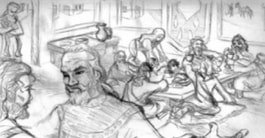
 RSS Feed
RSS Feed